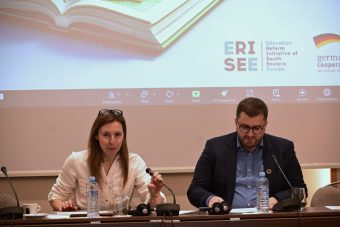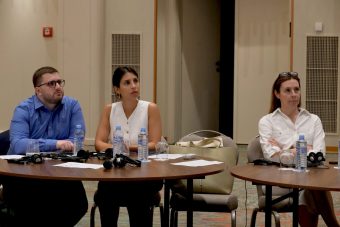The regional meeting titled “Energy Transition and Human Capital Development: Action Plan to Support Education and Training in the Renewable Energy Sector” was held on July 3–4, 2025, in Skopje, North Macedonia.
The event brought together representatives from the vocational education and training (VET) sector, energy industry, education ministries, qualification agencies, chambers of commerce, and the private sector from six Western Balkan economies. The main objective was to discuss and adopt the regional Action Plan for education and training in the field of renewable energy, with the aim of defining concrete actions the education sector should undertake in support of the energy transition.
During the event, distinguished energy sector experts shared their perspectives on the challenges of the green transition.

Dr. Eng. Alexandru Mureșan, CEO of the company Renergia and lecturer at the Technical University of Cluj-Napoca (Romania), referred to education as the “secret weapon” of the European Green Deal. Speaking from the perspective of a former EUSEW Young Energy Ambassador, he emphasized that every euro invested in the green transition must be accompanied by a corresponding investment in education and capacity building—across all levels of society. He highlighted that a successful, inclusive, and fair transition requires not only a qualified workforce but also broad societal support and behavioral change toward sustainable resource use. Education, he stressed, remains the most effective and sustainable strategy for tackling the complex challenges of the energy transition.
Viktor Dimitrievski, representative of EVN Macedonia, spoke from the standpoint of a distribution system operator on the growing demand for qualified personnel due to the rapid development of the RES sector. Over the past two years, RES capacities in North Macedonia have doubled, further increasing the need for training and employment. Dimitrievski presented EVN’s recruitment optimization strategies, as well as experiences with dual education programs that connect high school students and companies through practical training.
More:
- Bulgaria Announces New Oil and Gas Exploration in the Black Sea
- Croatia Adopts Key Laws to Modernize the Energy Sector
- SET Trebinje 2025: Immature Projects and Unaligned Regulations Hinder the Region’s Energy Transition
Aleksandar Macura, external expert, presented the draft Regional Action Plan for education and training in the RES sector. The plan was developed based on an analysis of the obligations of Western Balkan countries, the current state of the education system, and survey results conducted among teachers regarding their needs in the area of sustainable development. Following the presentation, an interactive workshop was held, during which concrete measures and activities were developed. The final version of the Action Plan will be created after consolidating the comments and suggestions collected during the meeting.
Ilgin Varneke, advisor at GIZ, presented the Regional Climate Partnership between the Western Balkans and Germany, aimed at supporting the region in aligning with the Paris Agreement, the European Green Deal, and the Green Agenda for the Western Balkans. According to her, Germany has committed to providing up to one billion euros in grants and development loans by 2030, along with an additional 500 million euros in promotional loans for the energy sectors of the WB6 countries. This support includes projects in solar energy, sustainable transport, technical assistance, and reforms in the education and climate policy sectors. A key focus will be on the development of skills and knowledge as the foundation of a successful energy transition.

The meeting was concluded by Tina Šarić, Director of the ERI SEE Secretariat, who emphasized that the energy transition is already placing—and will continue to place—enormous pressure on the education and economic systems. The education sector must react swiftly to current needs while strategically planning for the long term—10, 15, even 20 years ahead—to prepare society for upcoming challenges. Teachers have a crucial role in this process, not only as transmitters of technical knowledge in the RES field but also as promoters of sustainability and environmental awareness. The Regional Action Plan is tasked with identifying these needs and proposing sustainable steps toward addressing them.
Finally, Ms. Šarić underscored the importance of regional cooperation, noting that although we face specific local challenges, we all share one planet—with the same responsibilities and rights to care for its future.
The event was jointly organized by the Education Reform Initiative of South Eastern Europe (ERI SEE) and the German Agency for International Cooperation (GIZ), as part of the RESET – Renewable Energy Services in Education and Training project. The RESET project is implemented by ERI SEE within the broader regional program Green Agenda: Decarbonisation of the Power Sector in the Western Balkans, led by GIZ and financed by the German Federal Ministry for Economic Cooperation and Development (BMZ).
Nevena Đukić

